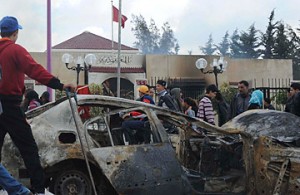One often hears old adages such as “change does not come overnight” or “Rome was not built in a day”, however, there are those events which grab society by its collective collar and demand action, not someday in the future, not tomorrow, not even today but right then and there. These are called catalytic events. The self immolation of Tarek al-Tayeb Mohamed Bouazizi on the 17th of December 2010 in a small impoverish town in the south of Tunisia was one such event. Bouazizi’s harrowing action in the face of the corrupt system that kept him and millions like him in poverty singlehandedly set in the motion a series of cataclysmic events that would later be dubbed “The Arab Spring”. The actions of Bouazizi in defying state authority through the destruction of the most sacred of all of his earthly possessions (his own body) gave the inspiration for millions of Arab youth from his home country of Tunisia to Yemen to the most populous Arab country of Egypt, to rise up and challenge the rule of the autocratic regimes that were in power.
Bouazizi cannot be credited with starting the opposition to the autocratic rulers of the Middle East and North Africa which what some in the West, who perhaps discovered the justices in Arab world as a result of the actions of Bouazizi, would like to claim. Each one of the countries did possesses recognized opposition forces that have suffered immensely under the despotic regimes that they opposed often with the tacit support of Western governments. What Bouazizi should be acknowledged for is the fact that through his self immolation millions found the strength to overcome their fear of death which is much more than what all of the existing had failed to achieve in their multi generational struggles for reform. In his piece titled From “Gay is Good” to the Scourge of AIDS: The Evolution of Gay LiberationRhetoric, 1977-1990 one of the definitions that James Darcey assigns to catalytic events is that they “are nontactical (either extraneous to the movement in origin, spontaneous in origin, or both” (46). This definition of the nature of catalytic events is most in line with the remarkable actions of Bouazizi on that fateful Friday morning in 2010.
The overall legacy of the Arab Spring might be debatable, especially in light of the continuing bloodbath in Syria, the implosion of Libya, the return of military rule in Egypt and further weakening of the already weak government of Yemen which was allowed Al Qaeda and their ilk to capture and hold cities and in some cases entire regions in the Arab world’s poorest state. However, what can never be denied is Bouazizi’s role as the one who lifted the lid from the simmering resentment in the hearts of millions and which lead to the removal of long time dictators Ben Ali (Tunisia), Mubarak (Egypt), Saleh (Yemen), Qaddafi (Libya) with perhaps Syria’s Assad next to go. All of these men were brutal dictators who have remained in power through the use of torture, forced disappearing and the extrajudicial execution of their opponents. It should be noted that prior to their removal by a populace that was fed up with their corruption and brutality, all of the men mentioned above were stalwart allies of the West with the exception of Qaddafi who reveled in his role as the enigmatic pariah of the world.
